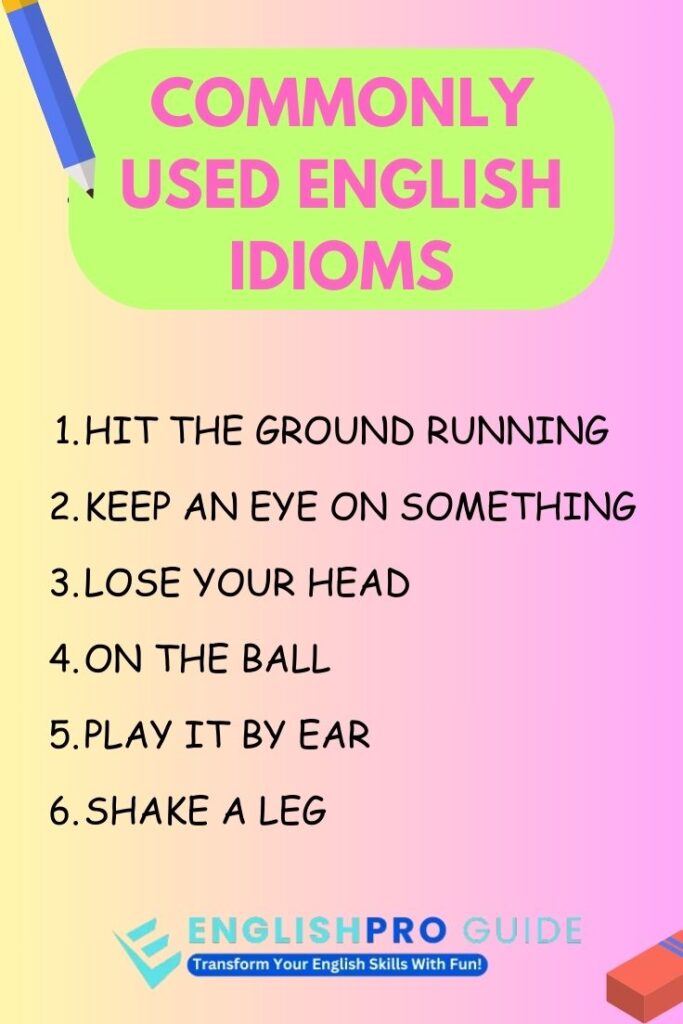100 Essential English Idioms You Should Know
Idioms are phrases or expressions that have meanings different from their literal definitions. They are a colorful and essential part of the English language, often used to convey thoughts or emotions in a way that is easy to understand for native speakers.
Learning idioms can help you sound more fluent and natural, making your English stand out. For students and language learners, idioms can be tricky at first but mastering them is a rewarding way to improve both comprehension and speech.
Below, we’ve created a detailed table with 100 commonly used idioms, their meanings, and example sentences to help you learn and practice effectively.
100 Commonly Used English Idioms

| SL | Commonly Used English Idiom |
|---|---|
| 1 | A blessing in disguise |
| 2 | Spill the beans |
| 3 | Costs an arm and a leg |
| 4 | Kill two birds with one stone |
| 5 | Bite the bullet |
| 6 | Walking on eggshells |
| 7 | The ball is in your court |
| 8 | Piece of cake |
| 9 | Raining cats and dogs |
| 10 | Break the ice |
| 11 | A picture is worth a thousand words |
| 12 | Add fuel to the fire |
| 13 | At the drop of a hat |
| 14 | Back to the drawing board |
| 15 | Burn the midnight oil |
| 16 | Cry over spilt milk |
| 17 | Cut corners |
| 18 | Easy does it |
| 19 | Every cloud has a silver lining |
| 20 | Go the extra mile |
| 21 | Hit the nail on the head |
| 22 | It takes two to tango |
| 23 | Jump on the bandwagon |
| 24 | Keep your chin up |
| 25 | Kick the bucket |
| 26 | Leave no stone unturned |
| 27 | Make a long story short |
| 28 | Miss the boat |
| 29 | On thin ice |
| 30 | Pull someone’s leg |
| 31 | See eye to eye |
| 32 | Smell a rat |
| 33 | Speak of the devil |
| 34 | Steal someone’s thunder |
| 35 | Take it with a grain of salt |
| 36 | The elephant in the room |
| 37 | Through thick and thin |
| 38 | Throw in the towel |
| 39 | Turn a blind eye |
| 40 | Under the weather |
| 41 | A bitter pill to swallow |
| 42 | A dime a dozen |
| 43 | Beat around the bush |
| 44 | Burn bridges |
| 45 | By the skin of your teeth |
| 46 | Caught red-handed |
| 47 | Don’t put all your eggs in one basket |
| 48 | Get cold feet |
| 49 | Give the benefit of the doubt |
| 50 | Hit the sack |
| 51 | Keep your fingers crossed |
| 52 | Know the ropes |
| 53 | Litmus test |
| 54 | Mountain out of a molehill |
| 55 | Once in a blue moon |
| 56 | Pull out all the stops |
| 57 | Sit on the fence |
| 58 | Stick to your guns |
| 59 | The best of both worlds |
| 60 | Throw caution to the wind |
| 61 | Bite off more than you can chew |
| 62 | Close shave |
| 63 | Don’t cry over spilled milk |
| 64 | Go down in flames |
| 65 | Heard it through the grapevine |
| 66 | Hit rock bottom |
| 67 | Jump the gun |
| 68 | Last straw |
| 69 | Lose your touch |
| 70 | Out of the blue |
| 71 | Put your foot in your mouth |
| 72 | Rock the boat |
| 73 | Run out of steam |
| 74 | Save it for a rainy day |
| 75 | Stab someone in the back |
| 76 | The early bird catches the worm |
| 77 | Tighten your belt |
| 78 | Bite the dust |
| 79 | Face the music |
| 80 | Get your act together |
| 81 | Hang in there |
| 82 | Hit the ground running |
| 83 | Keep an eye on something |
| 84 | Lose your head |
| 85 | On the ball |
| 86 | Play it by ear |
| 87 | Shake a leg |
| 88 | Step up your game |
| 89 | Take the plunge |
| 90 | Time flies |
| 91 | Wake-up call |
| 92 | Wild goose chase |
| 93 | You can say that again |
| 94 | Your guess is as good as mine |
| 95 | Out of one’s depth |
| 96 | Get the hang of it |
| 97 | Don’t judge a book by its cover |
| 98 | Burn the candle at both ends |
| 99 | Bend over backwards |
| 100 | Barking up the wrong tree |
Read More: Can You Start a Sentence with “Of Which”?
Commonly Used English Idioms with Meaning
| Idiom | Meaning | Example Sentence |
|---|---|---|
| A blessing in disguise | Something good that seemed bad at first | Losing that job was a blessing in disguise for my career. |
| Beat around the bush | Avoid saying what you mean, often because it is uncomfortable | Stop beating around the bush and tell me the truth. |
| Better late than never | It’s better to do something late than not do it at all | She finally arrived at the meeting—better late than never. |
| Bite the bullet | To face a difficult or unpleasant situation with courage | I’ll have to bite the bullet and visit the dentist. |
| Break the ice | To initiate conversation in a situation that feels awkward | The party was awkward until someone broke the ice with a joke. |
| Call it a day | Stop working on something, especially for the day | We’ve been working for hours, let’s call it a day. |
| Costs an arm and a leg | Something very expensive | That designer bag costs an arm and a leg! |
| Cry over spilled milk | Wasting time worrying about something that has already happened | It’s no use crying over spilled milk; we need to move forward. |
| Cut corners | To do something the easiest or cheapest way, often compromising quality | The builder cut corners, making the house unsafe. |
| Devil’s advocate | To argue against something for the sake of argument or to test a point | He played devil’s advocate to make sure we considered every option. |
| Don’t put all your eggs in one basket | Don’t risk everything on one venture | It’s better to diversify your investments—don’t put all your eggs in one basket. |
| Every cloud has a silver lining | Every bad situation has a positive aspect | Even after failing the test, I found a silver lining in what I learned. |
| Feel under the weather | To feel unwell | I won’t come to work today; I’m feeling under the weather. |
| Hit the nail on the head | To describe exactly what is causing a problem | You hit the nail on the head with your analysis of the issue. |
| Jump on the bandwagon | To start supporting something that is popular | Everyone’s jumping on the bandwagon of new tech trends now. |
| Kill two birds with one stone | Accomplish two tasks at the same time | By cycling to work, I kill two birds with one stone—exercise and commute. |
| Leave no stone unturned | Try everything possible to achieve a goal | We will leave no stone unturned to find the missing necklace. |
| Make a long story short | To give a brief explanation of what happened | To make a long story short, we missed the train and had to drive. |
| Piece of cake | Something very easy to do | This task is a piece of cake for someone with your skills. |
| The ball is in your court | It’s up to you to make the next decision | I’ve done my part; now the ball is in your court. |
| Raining cats and dogs | Very heavy rain | Grab an umbrella, it’s raining cats and dogs outside. |
| Break the bank | Something that is very expensive | A week’s vacation might break the bank on my budget. |
| Once in a blue moon | Very rarely | She goes out dancing once in a blue moon. |
| Spill the beans | Reveal a secret | Don’t invite Tom; he always spills the beans about surprises. |
| Burn the midnight oil | To work late at night | She burned the midnight oil studying for the final exam. |
| Walk on eggshells | To tread carefully as to not upset someone | After their argument, she felt like she was walking on eggshells around him. |
| Hit the books | To study seriously | Exams are coming up, so I need to hit the books this weekend. |
| Lose your touch | To lose your ability to do something as well as you used to | He used to be so good at chess; he’s losing his touch nowadays. |
| Ignorance is bliss | Not knowing something can make it easier to avoid worries | I didn’t read the news today—ignorance is bliss sometimes. |
Tips to Practice and Use Idioms Effectively
Learning idioms can feel overwhelming, but with the right strategies, you can integrate them into your daily conversations naturally. Here are a few tips:
- Learn Idioms in Context
Instead of memorizing lists, focus on understanding idioms in sentences or conversations. This helps you grasp how and when to use them. - Practice with Media
Watch English movies, listen to podcasts, or read articles where idioms are commonly used. Pay attention to their usage. - Try Flashcards
Create flashcards with an idiom on one side and its meaning and example on the other. This method is great for quick review. - Use Idioms in Conversations
Practice using idioms in your daily interactions. Don’t worry about being perfect—native speakers will appreciate your effort. - Engage in Writing Exercises
Write short paragraphs or stories using several idioms. This will strengthen your ability to blend them seamlessly into communication.
Idioms add richness, humor, and depth to the English language. By mastering them, you can take your English fluency to the next level. Keep practicing, and soon you’ll be speaking like a natural!
Read More: Can You Start a Sentence with Having? Unlock the Structure
Quiz: Test Your English Idioms Knowledge!
Do you think you’ve mastered the 100 commonly used idioms? Take this quiz and see how well you understand their meanings and usage! 📚✍️
Question 1
What does the idiom “A blessing in disguise” mean?
A. Something that is much worse than expected
B. Something good that seemed bad at first
C. A secret gift from someone
D. Something you never wanted
Correct Answer: B
Question 2
If someone says, “Stop beating around the bush,” what do they mean?
A. Stop trimming the hedges
B. Come straight to the point
C. Avoid a dangerous area
D. Talk about random topics
Correct Answer: B
Question 3
What does the idiom “Costs an arm and a leg” imply?
A. Something very expensive
B. A physical injury
C. A demanding achievement
D. Saving money on cheap items
Correct Answer: A
Question 4
When someone says “Kill two birds with one stone,” what are they suggesting?
A. Multitasking efficiently
B. Ending an argument
C. Finishing work late
D. Traveling far in one trip
Correct Answer: A
Question 5
What does “Spill the beans” mean?
A. Start cooking dinner
B. Reveal a secret
C. Clean up after a mess
D. Share good news
Correct Answer: B
Question 6
If it’s “Raining cats and dogs,” what’s the weather like?
A. Slight drizzle
B. Very heavy rain
C. Freezing and snowy
D. Hot and humid
Correct Answer: B
Question 7
What does “The ball is in your court” refer to?
A. Making a game-winning move
B. The next decision is yours to make
C. Playing a fair game
D. Losing control of a situation
Correct Answer: B
Question 8
What does the idiom “Bite the bullet” mean?
A. Keep a secret
B. Face a difficult situation with courage
C. Talk in a low voice
D. Make a risky decision
Correct Answer: B
Question 9
If someone says “Piece of cake,” they mean…
A. A delicious dessert
B. A very easy task
C. A job requiring patience
D. A challenging puzzle
Correct Answer: B
Question 10
What does “Walking on eggshells” mean?
A. Being very cautious to avoid upsetting someone
B. Taking a leisurely walk
C. Preparing for a major event
D. Solving a tricky problem
Correct Answer: A
How Did You Do?
- 8-10 Correct: Idiom master! You’re fluent in understanding English idioms.
- 5-7 Correct: Great job! A little more practice, and you’ll get there.
- Below 5: Don’t worry! Revisit the blog and learn from the examples—it’s all about persistence.
Keep practicing, and soon you’ll be using idioms like a natural speaker! 🥳






